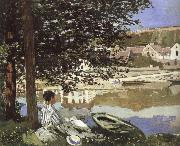
Oil On
Canvas, Real Flavor of Old Masters
|
Claude Monet
|
|||
|
|
|||
| French Impressionist Painter, 1840-1926 Claude Oscar Monet (14 November 1840 C 5 December 1926) was a founder of French impressionist painting, and the most consistent and prolific practitioner of the movement's philosophy of expressing one's perceptions before nature, especially as applied to plein-air landscape painting. The term Impressionism is derived from the title of his painting. Claude Monet was born on 14 November 1840 on the fifth floor of 45 rue Laffitte, in the ninth arrondissement of Paris . He was the second son of Claude-Adolphe and Louise-Justine Aubree Monet, both of them second-generation Parisians. On 20 May 1841, he was baptised into the local church parish, Notre-Dame-de-Lorette as Oscar-Claude. In 1845, his family moved to Le Havre in Normandy. His father wanted him to go into the family grocery store business, but Claude Monet wanted to become an artist. His mother was a singer. On the first of April 1851, Monet entered the Le Havre secondary school of the arts. He first became known locally for his charcoal caricatures, which he would sell for ten to twenty francs. Monet also undertook his first drawing lessons from Jacques-François Ochard, a former student of Jacques-Louis David. On the beaches of Normandy in about 1856/1857 he met fellow artist Eugene Boudin who became his mentor and taught him to use oil paints. Boudin taught Monet "en plein air" (outdoor) techniques for painting. On 28 January 1857 his mother died. He was 16 years old when he left school, and went to live with his widowed childless aunt, Marie-Jeanne Lecadre. After several difficult months following the death of Camille on 5 September 1879, a grief-stricken Monet (resolving never to be mired in poverty again) began in earnest to create some of his best paintings of the 19th century. During the early 1880s Monet painted several groups of landscapes and seascapes in what he considered to be campaigns to document the French countryside. His extensive campaigns evolved into his series' paintings. Camille Monet had become ill with tuberculosis in 1876. Pregnant with her second child she gave birth to Michel Monet in March 1878. In 1878 the Monets temporarily moved into the home of Ernest Hosched, (1837-1891), a wealthy department store owner and patron of the arts. Both families then shared a house in Vetheuil during the summer. After her husband (Ernest Hoschede) became bankrupt, and left in 1878 for Belgium, in September 1879, and while Monet continued to live in the house in Vetheuil; Alice Hosched helped Monet to raise his two sons, Jean and Michel, by taking them to Paris to live alongside her own six children. They were Blanche, Germaine, Suzanne, Marthe, Jean-Pierre, and Jacques. In the spring of 1880 Alice Hosched and all the children left Paris and rejoined Monet still living in the house in Vetheuil. In 1881 all of them moved to Poissy which Monet hated. From the doorway of the little train between Vernon and Gasny he discovered Giverny. In April 1883 they moved to Vernon, then to a house in Giverny, Eure, in Upper Normandy, where he planted a large garden where he painted for much of the rest of his life. Following the death of her estranged husband, Alice Hosched married Claude Monet in 1892. | |||
|
|
|||
|
|
The River new19/Claude Monet-682846.jpg Painting ID:: 54571 Visit European Gallery |
mk235 1868 Oil on canvas 81.5x100.7cm | |
Height Width |
INS/CM |
||
|
X |
|
||
|
|
|||







